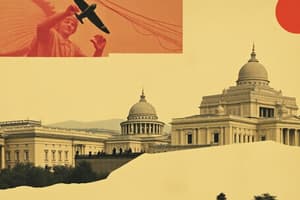Podcast
Questions and Answers
ଇତିହାସ କାହାକୁ କୁହାଯାଏ?
ଇତିହାସ କାହାକୁ କୁହାଯାଏ?
- ପ୍ରାଚୀନ ସହରଗୁଡିକୁ
- ସାମାଜିକ ବିକାଶକୁ
- ଆଧୁନିକ ପ୍ରବୃତ୍ତିଗୁଡିକୁ
- ମନୁଷ୍ୟ କାର୍ଯ୍ୟ ସମ୍ପର୍କରେ ଘଟଣାବଳୀକୁ (correct)
ପ୍ରାଚୀନ ଇତିହାସର ଆରମ୍ଭ କେବେ ହୋଇଛି?
ପ୍ରାଚୀନ ଇତିହାସର ଆରମ୍ଭ କେବେ ହୋଇଛି?
- 3200 BCE (correct)
- 1000 BCE
- 500 BCE
- 1500 CE
ଗ୍ରୀକ ଓ ରୋମାନ୍ ଇମ୍ପାୟାର ପ୍ରସ୍ତୁତି କେବେ ହୋଇଥିଲା?
ଗ୍ରୀକ ଓ ରୋମାନ୍ ଇମ୍ପାୟାର ପ୍ରସ୍ତୁତି କେବେ ହୋଇଥିଲା?
- 200 CE
- 500 CE
- 500 BCE (correct)
- 300 CE
ମଧ୍ୟୟୁଗର ଆରମ୍ଭ କେବେ ହେଲା?
ମଧ୍ୟୟୁଗର ଆରମ୍ଭ କେବେ ହେଲା?
ସେକେଣ୍ଡରୀ ସ୍ନାୟୁ କ’ଣ?
ସେକେଣ୍ଡରୀ ସ୍ନାୟୁ କ’ଣ?
ନେଲସନ୍ ମାଣ୍ଡେଲା କେବେ ଅବସର ଗ୍ରହଣ କରିଥିଲେ?
ନେଲସନ୍ ମାଣ୍ଡେଲା କେବେ ଅବସର ଗ୍ରହଣ କରିଥିଲେ?
ପୂର୍ବ ଏତେ ଡାକରେ କେତେ ରାଷ୍ଟ୍ରରୁ ଦଳନ କରାଯାଇଥିଲା?
ପୂର୍ବ ଏତେ ଡାକରେ କେତେ ରାଷ୍ଟ୍ରରୁ ଦଳନ କରାଯାଇଥିଲା?
ଏକ ସାମାଜିକ ପରିବର୍ତ୍ତନ କ’ଣକୁ ପ୍ରଭାବିତ କରେ?
ଏକ ସାମାଜିକ ପରିବର୍ତ୍ତନ କ’ଣକୁ ପ୍ରଭାବିତ କରେ?
Flashcards are hidden until you start studying
Study Notes
Definition of History
- Study of past events, particularly in human affairs.
- Involves the analysis of social, political, economic, and cultural changes over time.
Major Time Periods
-
Prehistoric Era
- Before written records.
- Includes Paleolithic, Mesolithic, and Neolithic periods.
-
Ancient History
- Emergence of writing (~3200 BCE).
- Civilizations like Mesopotamia, Egypt, Indus Valley, and China.
-
Classical Antiquity
- Around 500 BCE to 500 CE.
- Development of empires: Greek, Roman, Persian, etc.
-
Middle Ages
- From the fall of the Roman Empire (circa 500 CE) to Renaissance (circa 1500 CE).
- Feudalism, the spread of Christianity, Islamic Caliphates.
-
Modern History
- Renaissance (14th - 17th centuries) to Present.
- Industrial Revolution, colonization, world wars, Cold War.
Key Historical Concepts
- Primary Sources: Original documents from the time being studied (letters, artifacts).
- Secondary Sources: Interpretations or analyses based on primary sources (textbooks, articles).
- Historiography: The study of how history is written and the different interpretations of historical events.
Significant Events in World History
- Fall of the Roman Empire (476 CE): Marked the transition to the Middle Ages.
- Renaissance (14th-17th centuries): Cultural rebirth and the rediscovery of classical philosophy, literature, and art.
- Age of Exploration (15th-17th centuries): European exploration and colonization of Africa, the Americas, and Asia.
- World Wars:
- World War I (1914-1918): Major global conflict resulting in significant political change.
- World War II (1939-1945): Widespread destruction and the establishment of the United Nations.
Influential Historical Figures
- Julius Caesar: Roman general and statesman; pivotal in the demise of the Roman Republic.
- Genghis Khan: Founder of the Mongol Empire; expanded territory through conquest.
- Mahatma Gandhi: Leader in the Indian independence movement against British rule; proponent of non-violence.
- Nelson Mandela: Anti-apartheid revolutionary; first black president of South Africa.
Themes in History
- Conflict and Cooperation: Examines wars, treaties, and alliances.
- Social Change: Focuses on movements for civil rights, feminism, and labor rights.
- Technology and Innovation: The impact of technological advancements on societies.
- Cultural Exchange: Interaction between different cultures through trade, migration, and exploration.
Importance of Studying History
- Helps understand the present by providing context.
- Cultivates critical thinking and analytical skills.
- Fosters an appreciation for diverse cultures and perspectives.
ଇତିହାସର ପରିଚୟ
- ଇତିହାସ ହେଉଛି ଅତୀତର ଘଟଣା, ବିଶେଷକରି ମଣିଷ ସମାଜର କାର୍ଯ୍ୟକଳାପର ଅଧ୍ୟୟନ।
- ସମୟ ସାପେକ୍ଷରେ ସାମାଜିକ, ରାଜନୈତିକ, ଅର୍ଥନୈତିକ ଏବଂ ସାଂସ୍କୃତିକ ପରିବର୍ତ୍ତନର ବିଶ୍ଳେଷଣ ଇତିହାସ ଅନ୍ତର୍ଭୁକ୍ତ କରେ।
ପ୍ରମୁଖ ସମୟ ସମୟ
- ପ୍ରାଗ୍ଇତିହାସିକ ଯୁଗ: ଲେଖନ ପୂର୍ବର ସମୟ। ଏହା ପ୍ରସ୍ତର ଯୁଗ (ପ୍ୟାଲିଓଲିଥିକ), ମଧ୍ୟ ପ୍ରସ୍ତରଯୁଗ (ମେସୋଲିଥିକ) ଏବଂ ନବ ପ୍ରସ୍ତରଯୁଗ (ନିଓଲିଥିକ) ସାମିଲ।
- ପ୍ରାଚୀନ ଇତିହାସ: ଲେଖନର ଉତ୍ପତ୍ତି (ପ୍ରାୟ 3200 ଖ୍ରୀଷ୍ଟପୂର୍ବ) ସମୟ ସହ। ମେସୋପୋଟାମିଆ, ଇଜିପ୍ଟ, ଇଣ୍ଡସ୍ ଉପତ୍ୟକା ଏବଂ ଚାଇନା ଭଳି ସଭ୍ୟତା ଗୁଡ଼ିକ ଏହି ଯୁଗରେ ଉତ୍ତୀର୍ଣ୍ଣ ହୋଇଥିଲା।
- ଶାସ୍ତ୍ରୀୟ ପ୍ରାଚୀନତା: ପ୍ରାୟ 500 ଖ୍ରୀଷ୍ଟପୂର୍ବ ସମୟ ଠାରୁ 500 ଖ୍ରୀଷ୍ଟାବ୍ଦ ପର୍ଯ୍ୟନ୍ତ। ଗ୍ରୀକ, ରୋମାନ, ପର୍ସିଆନ ଭଳି ସାମ୍ରାଜ୍ୟର ବିକାଶ ଏହି ଯୁଗରେ ହେଉଛି।
- ମଧ୍ୟଯୁଗ: ରୋମାନ ସାମ୍ରାଜ୍ୟର ପତନ (ପ୍ରାୟ 500 ଖ୍ରୀଷ୍ଟାବ୍ଦ) ଠାରୁ ପୁନରୁଜ୍ଜୀବନ (ପ୍ରାୟ 1500 ଖ୍ରୀଷ୍ଟାବ୍ଦ) ପର୍ଯ୍ୟନ୍ତ। ସାମନ୍ତବାଦ, ଖ୍ରୀଷ୍ଟାନ ଧର୍ମର ପ୍ରସାର, ଇସଲାମିକ ଖଲିଫତ ଏହି ଯୁଗରେ ଥିଲା।
- ଆଧୁନିକ ଇତିହାସ: ପୁନରୁଜ୍ଜୀବନ (14 ଶତାବ୍ଦୀ - 17 ଶତାବ୍ଦୀ) ଠାରୁ ବର୍ତମାନ ପର୍ଯ୍ୟନ୍ତ। ଶିଳ୍ପ କ୍ରାନ୍ତି, ଉପନିବେଶ, ବିଶ୍ୱଯୁଦ୍ଧ, ଶୀତ ଯୁଦ୍ଧ ଏହି ଯୁଗରେ ଘଟିଛନ୍ତି।
ମୁଖ୍ୟ ଐତିହାସିକ ଧାରଣା
- ପ୍ରାଥମିକ ସ୍ରୋତ: ଅଧ୍ୟୟନ କରାଯାଉଥିବା ସମୟର ମୂଳ ଡକ୍ୟୁମେଣ୍ଟ (ପତ୍ର, ପ୍ରାଚୀନ ସାମଗ୍ରୀ)।
- ଦ୍ୱିତୀୟକ ସ୍ରୋତ: ପ୍ରାଥମିକ ସ୍ରୋତ ଉପରେ ଆଧାରିତ ବ୍ୟାଖ୍ୟା କିମ୍ବା ବିଶ୍ଳେଷଣ (ପାଠ୍ୟପୁସ୍ତକ, ପ୍ରବନ୍ଧ)।
- ଐତିହାସିକ ସାହିତ୍ୟ: ଇତିହାସ କିପରି ଲିଖିତ ହେଉଛି ଏବଂ ଐତିହାସିକ ଘଟଣାର ବିଭିନ୍ନ ବ୍ୟାଖ୍ୟାର ଅଧ୍ୟୟନ।
ବିଶ୍ୱ ଇତିହାସରେ ଗୁରୁତ୍ୱପୂର୍ଣ୍ଣ ଘଟଣା
- ରୋମାନ ସାମ୍ରାଜ୍ୟର ପତନ: 476 ଖ୍ରୀଷ୍ଟାବ୍ଦ ସମୟରେ ମଧ୍ୟଯୁଗ ଆରମ୍ଭ ହୋଇଥିବା ସଙ୍କେତ।
- ପୁନରୁଜ୍ଜୀବନ: 14 ଶତାବ୍ଦୀ - 17 ଶତାବ୍ଦୀ ସମୟରେ ସାଂସ୍କୃତିକ ପୁନରୁଜ୍ଜୀବନ ଏବଂ ପ୍ରାଚୀନ ଦର୍ଶନ, ସାହିତ୍ୟ ଏବଂ କଳାର ପୁନର୍ବିଚାର।
- ସମୁଦ୍ରଯାତ୍ରାର ଯୁଗ: 15 ଶତାବ୍ଦୀ - 17 ଶତାବ୍ଦୀରେ ୟୁରୋପୀୟ ସମୁଦ୍ରଯାନ ଏବଂ ଆଫ୍ରିକା, ଆମେରିକା ଏବଂ ଏସିଆ ଉପନିବେଶ।
- ବିଶ୍ୱଯୁଦ୍ଧ:
- ପ୍ରଥମ ବିଶ୍ୱଯୁଦ୍ଧ: 1914 ରୁ 1918 ପର୍ଯ୍ୟନ୍ତ ବିଶ୍ୱବ୍ୟାପୀ ଯୁଦ୍ଧ ଯାହାର ଫଳରେ ଗୁରୁତ୍ୱପୂର୍ଣ୍ଣ ରାଜନୈତିକ ପରିବର୍ତ୍ତନ ଘଟିଥିଲା।
- ଦ୍ୱିତୀୟ ବିଶ୍ୱଯୁଦ୍ଧ: 1939 ରୁ 1945 ପର୍ଯ୍ୟନ୍ତ ବ୍ୟାପକ ବିନାଶ ଏବଂ ସଂଯୁକ୍ତ ଜାତିସଂଘର ପ୍ରତିଷ୍ଠା।
ପ୍ରଭାବଶାଳୀ ଐତିହାସିକ ବ୍ୟକ୍ତିତ୍ୱ
- ଜୁଲିଅସ୍ ସିଜାର: ରୋମାନ ସୈନିକ ଏବଂ ରାଜନେତା; ରୋମାନ ଗଣରାଜ୍ୟର ପତନରେ ମୁଖ୍ୟ ଭୂମିକା।
- ଚିଙ୍ଗିସ ଖାନ: ମଙ୍ଗୋଲ ସାମ୍ରାଜ୍ୟର ସ୍ଥାପନାକାରୀ; ବିଜୟ ମାଧ୍ୟମରେ କ୍ଷେତ୍ର ବିସ୍ତାର।
- ମହାତ୍ମା ଗାନ୍ଧୀ: ବ୍ରିଟିଶ ଶାସନରୁ ଭାରତୀୟ ସ୍ୱାଧୀନତା ଆନ୍ଦୋଳନରେ ନେତା; ଅହିଂସାର ପ୍ରଚାରକ।
- ନେଲସନ୍ ମଣ୍ଡେଲା: ଆପାର୍ଥାଇଡ୍ର ବିରୋଧୀ କ୍ରାନ୍ତିକାରୀ; ଦକ୍ଷିଣ ଆଫ୍ରିକାର ପ୍ରଥମ କଳା ପ୍ରଧାନମନ୍ତ୍ରୀ।
ଇତିହାସରେ ଥିମ୍ସ
- ସଂଘର୍ଷ ଏବଂ ସହଯୋଗ: ଯୁଦ୍ଧ, ସନ୍ଧି ଏବଂ ମିତ୍ରତାର ପରୀକ୍ଷା।
- ସାମାଜିକ ପରିବର୍ତ୍ତନ: ନାଗରିକ ଅଧିକାର, ନାରীବାଦ ଏବଂ ଶ୍ରମିକ ଅଧିକାର ଆন্দୋଳନର ପରୀକ୍ଷା।
- ପ୍ରযୁক্তি ଏବଂ ନବୋନ୍ମେষ: ସମାଜ ଉପରେ ପ୍ରযুক্তিগত ଅগ্রগতির ପ୍ରଭାବ।
- ସାଂସ୍କୃତିକ ବିନିମୟ: ବାণিজ୍ୟ,
ଇତିହାସ ଅଧ୍ୟୟନର ଗୁରୁତ୍ୱ
- ପ୍ରেক্ষাপট ଯୋଗାଇ ବর୍ତ୍ତମାନକୁ ବୁଝିବାରେ সাহায্য করে।
- সমালোচনামূলক চিন্তା ଏବଂ ବିଶ୍ଳେଷଣ ଦକ୍ଷତା ବিকଶିତ କରେ।
Studying That Suits You
Use AI to generate personalized quizzes and flashcards to suit your learning preferences.




